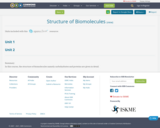
In this course, the structure of biomolecules namely carbohydrates and proteins are given in detail.
- Subject:
- Forestry and Agriculture
- Life Science
- Material Type:
- Primary Source
- Date Added:
- 08/27/2019


In this course, the structure of biomolecules namely carbohydrates and proteins are given in detail.
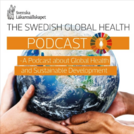
Episode 1, part 1: Interview with Sir Michael Marmot, Professor of Epidemiology and Public Health at University College London about the current state of Global Health, with special focus on Health Equity. The first episode consists of two parts.
-------
The Swedish Global Health Podcast - A Podcast about Global Health and Sustainable Development is aimed at anyone interested in knowing more about this exciting topic! It is co-produced by the Swedish Society of Medicine's Committee for Global Health and the Swedish Society of Medicine's student and junior doctor section.
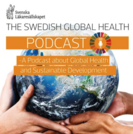
Episode 1, part 2: Interview with Sir Michael Marmot and Rt Hon Helen Clark, former Prime Minister of New Zealand and Administrator of the United Nations Development Programme, about collaboration between public Health experts and politicians, evidence driven policy, gender equality and the way forward for global health.
-------
The Swedish Global Health Podcast - A Podcast about Global Health and Sustainable Development is aimed at anyone interested in knowing more about this exciting topic! It is co-produced by the Swedish Society of Medicine's Committee for Global Health and the Swedish Society of Medicine's student and junior doctor section.
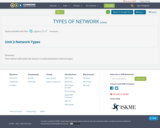
This content will enable the learner to understand about network types.
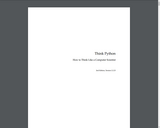
The goal of this book is to teach you to think like a computer scientist. This way of thinking combines some of the best features of mathematics, engineering, and natural science. Like mathematicians, computer scientists use formal languages to denote ideas (specifically computations). Like engineers, they design things, assembling components into systems and evaluating tradeoffs among alternatives. Like scientists, they observe the behavior of complex systems, form hypotheses, and test predictions.

Welcome to the White House 360 Virtual Tour! This immersive experience will bring you inside the halls of the White House and provide access to all the public rooms on the Ground and State Floors. It will also allow you to examine the rooms and objects even closer than you would in person.
This feature was made possible in part by the National Endowment for the Humanities: Exploring the human endeavor.
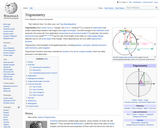
Contents :
1 History
2 Overview
2.1 Extending the definitions
2.2 Mnemonics
2.3 Calculating trigonometric functions
3 Applications
4 Pythagorean identities
5 Angle transformation formulae
6 Common formulae
6.1 Law of sines
6.2 Law of cosines
6.3 Law of tangents
6.4 Euler's formula
7 See also
8 References
9 Bibliography
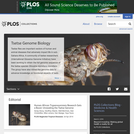
Tsetse flies are important vectors of human and animal diseases that adversely impact life in sub-Sahara Africa. A community of tsetse researchers (International Glossina Genome Initiative) have been working to obtain the full genome sequence of the tsetse species Glossina morsitans morsitans. The group have also mined the genome data to advance knowledge on functional aspects of tsetse and African trypanosome biology. This collection describes findings on tsetse's salivary gland biology, olfactory chemistry, lactation process, acquaporin proteins that play a role in lactation, oxidative stress responses during pregnancy, gut peritrophic matrix analysis and horizontal transfer events discovered in tsetse's genome from the symbiont Wolbachia. Further manuscripts reflect on the historical aspects of sleeping sickness epidemics that have plagued sub-Sahara in the 20th century.
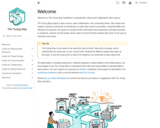
The Turing Way project is open source, open collaboration, and community-driven. We involve and support a diverse community of contributors to make data science accessible, comprehensible and effective for everyone. Our goal is to provide all the information that researchers and data scientists in academia, industry and the public sector need to ensure that the projects they work on are easy to reproduce and reuse.
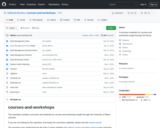
This Github repository contains curriculum and materials for courses and workshops taught through the University of Miami Libraries.
If you are not looking for the repository, but simply the curriculum materials, please see the hosted version: https://umiamilibraries.github.io/courses-and-workshops/.
The repository was started through the Data Curation Initiative (http://library.miami.edu/datacuration) at the University of Miami Libraries (http://library.miami.edu).
The repository was created by Tim Norris with help and inspiriation from many others including Elizabeth Fish, Angela Clark, and all the students, faculty, and staff who have participated in the seminar.

An interactive reference work on the UN Sustainable Development Goals with short introductions to the goals, the official translations and numbering of the 17 goals and the 169 underlying targets, zoom in / zoom out at goal or target level, powerful search function, and "deep" hyperlinks to the UN website about the goals.Compact and online available interactive reference work that can be useful in all kinds of learning activities related to the SDGs.Currently available in English, Spanish, French and Dutch.Free to use online, but also to download and "embed" in other websites (HTML5); the source code is also freely available (MMAP).
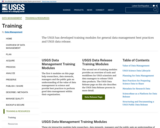
These six interactive modules help researchers, data stewards, managers and the public gain an understanding of the value of data management in science and provide best practices to perform good data management within their organization.
Acknowledgments
The USGS Data Management Training modules were funded by the USGS Community for Data Integration and the USGS Office of Organizational and Employee Development's Technology Enabled Learning Program in collaboration with Bureau of Land Management, California Digital Library, and Oak Ridge National Laboratory. Special thanks to Jeffrey Morisette, Dept. of the Interior North Central Climate Science Center; Janice Gordon, USGS Science Analytics and Synthesis; National Indian Programs Training Center; and Keith Kirk, USGS Office of Science Quality Information.
Cite: U.S. Geological Survey, 2021, USGS Data Management Website: U.S. Geological Survey, https://doi.org/10.5066/F7MW2G15.
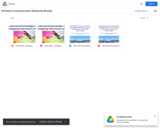
The OER, consisting of an Instructor’s Guide and accompanying presentation Slide Deck with speaking notes, emphasizes three primary themes:
- Principles and practices of community engagement for knowledge exchange;
- Meaningful access to research for non-academic audiences;
- Research ethics in historically marginalized underrepresented communities.
We have organized the OER to consist of a “core” module, “Community-based knowledge exchange and mitigating information privilege” and three pathways: 1) “Information access and alternative formats,” 2) “Supporting community led research,” and 3) “Community engagement and services.” Instructors can “mix and match” content from the pathways depending on available class time, course structure, and student interests. The core and pathway modules include learning objectives, a wide selection of open access academic and professional articles, books, blogs, websites, videos and multimedia, and active learning activities for in-person or online delivery.
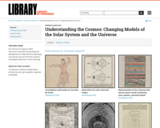
A selection of Library of Congress primary sources exploring the topic of models of the solar system and universe, including models by Ptolemy, Copernicus, Descartes, and Galileo. This set also includes a Teacher's Guide with historical context and teaching suggestions.
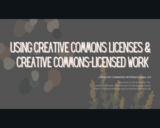
A look at how Creative Commons are applied to allow for remix, adaptation, and derivatives, and how to stay between the lines with each type of permission or restriction.
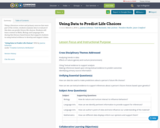
Using a literature review and primary sources that were part of the review, students examine data to evaluate if this data can predict future life choices. Students will learn content in Math, Biology and Language Arts during this literacy-based lesson that supports students in using textual evidence to develop and support claims.
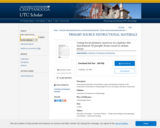
Instructional materials on local history topics developed by students at the University of Tennessee at Chattanooga for use in secondary education classrooms.
The purpose of this lesson is to build upon students’ prior knowledge of analyzing primary sources, the Industrial Revolution, and Chattanooga history. Students will learn to identify major industrial centers in America and use primary sources to determine causes of rural to urban migration during the industrial revolution, using Chattanooga as a case study. By the end of the case study, students should be able to describe how industrialization influenced the movement of people from rural to urban areas. This lesson will also serve to encourage critical literacy and engagement with the community.
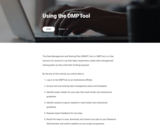
The Data Management and Sharing Plan (DMSP) Tool, or DMPTool, is a free resource for anyone to use that helps researchers create data management sharing plans as they write their funding proposal.
By the end of this tutorial, you will be able to:
- Log in to the DMPTool as an institutional affiliate.
- Access and use existing data management plans and templates.
- Identify project details for your plan that meet funder and institutional guidelines.
- Identify research outputs needed to meet funder and institutional guidelines.
- Request expert feedback for your plan.
Recall the steps to save, download, and submit your plan to your Research Administrator and submit updates as your project progresses.
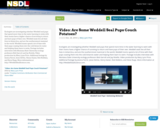
Ecologists are investigating whether Weddell seal pups that spend more time in the water learning to swim with their moms have a higher chance of surviving to return and have pups of their own. Weddell seals live all their lives in Antarctica, and are the southernmost mammal in the world. Weddell moms spend a lot of time with their pups coaxing them into the cold Antarctic water and helping them learn to swim. Footage includes interviews with Montana State University ecology professors Bob Garrott and Jay Rotella. Video production by Mary Lynn Price. Additional footage by Jessica Farrer, Jesse DeVoe, Henry Kaiser, Rob Robbins, and Steve Rupp. More information at http://WeddellSealScience.com.
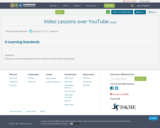
E-Lesson creation using web tools for students of Polytechnic Institutions